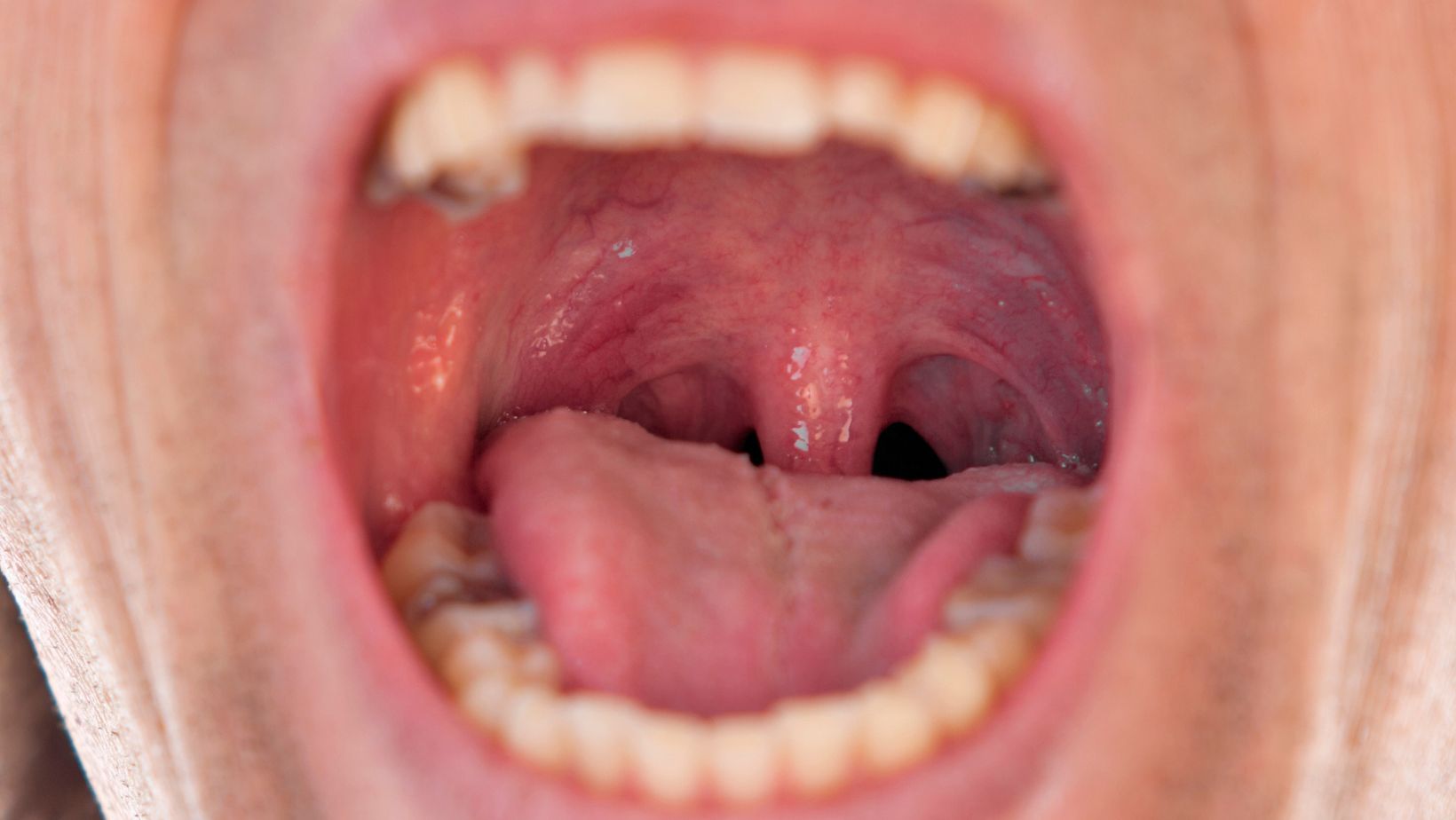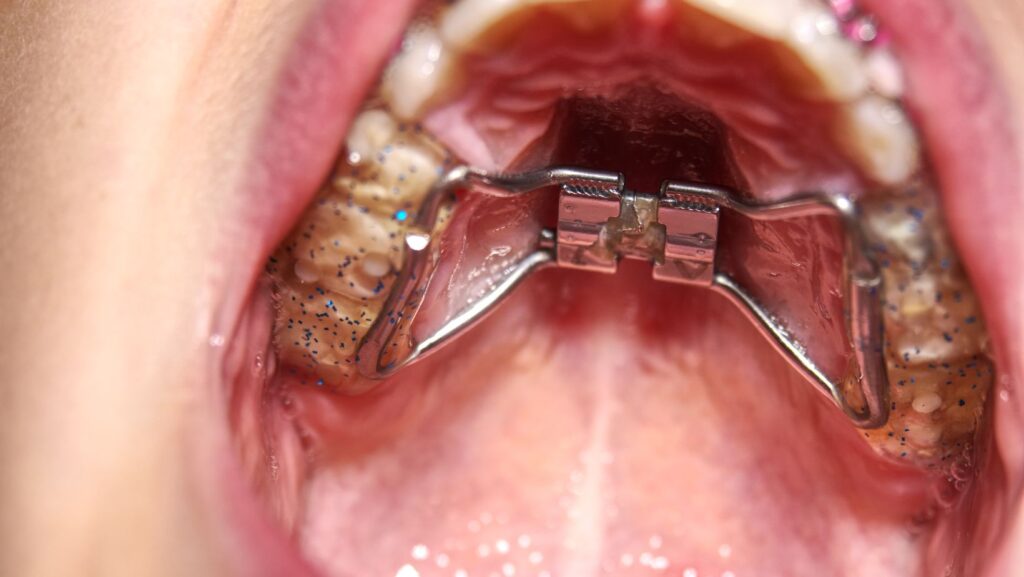Anchor Text: treatment with an orthodontic expander
Do you feel like your teeth are crowded or your bite doesn’t fit right?
A narrow palate might be the cause. This means the top part of your mouth is too small, which can lead to problems with your teeth and even make it hard to breathe or speak.
Knowing the signs of a narrow palate is important so you can get help early. It can be caused by things like family history or certain habits. In this guide, we will look at what a narrow palate is, how it affects your health, and the treatments you can try.
Causes of a Narrow Palate
A narrow palate can happen for many reasons, like habits or family history. One cause is a restricted tongue-tie, which stops the tongue from moving freely and affects how the jaw grows.
Other things, like mouth breathing or thumb-sucking, can also lead to it. Knowing the causes helps find solutions.
Restricted Tongue-Tie
A restricted tongue-tie happens when the tissue under the tongue is too tight. This can stop the tongue from moving freely, which may affect how the upper jaw grows.
Sometimes, it is linked to a genetic disorder that impacts development. Restricted tongue-tie can lead to a narrow palate, causing crowded teeth and jaw misalignment.
Identifying this early is important for improving jaw health and growth. Treatments, such as orthodontic expanders, can help correct issues caused by a narrow palate.
Mouth Breathing
Mouth breathing happens when someone breathes through their mouth instead of their nose. This might be because of a stuffy nose or a habit. Breathing this way can change how the upper jaw grows and lead to a narrow palate.
It may also cause breathing problems, crowded teeth, and changes in the face. Mouth breathing during childhood is important to fix because it affects how the jaw forms as kids grow.
Finding and treating it early can stop bigger problems later. Sometimes, orthodontic expanders are used to help widen the palate and fix alignment issues.
Thumb-Sucking
Thumb-sucking is a common habit in young children, but it can affect how the upper jaw grows if it continues for too long. The pressure from the thumb pushes the roof of the mouth upward, causing a narrow palate to form over time.
This can lead to crowded teeth, speech problems, or difficulty with chewing. The longer thumb-sucking goes on, the more likely it is to change how the teeth and jaw align.
Early intervention, like helping children stop the habit, is key to preventing lasting issues. In some cases, orthodontic expanders may be used later to correct a narrow palate and improve alignment. Identifying the habit early makes treatment easier and more effective.
Poor Tongue Posture
The way the tongue rests in the mouth can greatly impact jaw growth. Poor tongue posture, where the tongue stays low or does not press against the roof of the mouth, can lead to a narrow palate.
This happens because the tongue helps shape the upper jaw during growth. Without proper tongue placement, the jaw may not widen as it should, causing crowded teeth and alignment issues.
Poor tongue posture can develop due to habits or certain medical conditions. Correcting this early with exercises or therapy can promote better jaw development.
In some cases, orthodontic expanders may also be used to widen the palate and improve overall alignment. Early awareness and treatment make a big difference.
Symptoms of a Narrow Palate
A narrow palate can cause various symptoms that affect oral health and daily life. Crowded teeth, speech difficulties, and breathing problems are common signs. It may also lead to jaw pain or misalignment.
Recognizing these symptoms early is important for getting the right treatment and improving overall comfort and function.
Crowded Teeth
Crowded teeth occur when there isn’t enough space in the upper jaw for all the teeth to fit properly. This can be caused by a narrow palate, where the jaw is too small to accommodate the teeth. As a result, misaligned teeth show and overlap.
Crowded teeth can affect the appearance of your smile and may also make cleaning your teeth more difficult, increasing the risk of cavities and gum disease.

Over time, this misalignment can lead to other oral health problems. Early treatment is key to preventing further complications. Using orthodontic devices, such as expanders or braces, can help align the teeth and improve jaw space, leading to a more comfortable and healthier smile.
Breathing Problems
Breathing problems can be a result of a narrow palate, especially when the upper jaw is too small. This lack of space may block the nasal passages, making it harder to breathe through the nose.
As a result, people may rely on mouth breathing, which can lead to other oral health issues. In some cases, misaligned teeth can also occur due to the limited space in the mouth.
The combination of breathing difficulties and misaligned teeth can affect overall health and well-being. Early intervention, such as orthodontic treatment or palate expanders, can help address these issues.
Correcting the alignment of the jaw and teeth can also improve breathing patterns and enhance both oral health and comfort.
Speech Issues
Speech issues can happen when a narrow palate makes it hard to form sounds correctly. A smaller upper jaw can cause teeth to misalign, which makes it tough to speak clearly.
This can lead to a speech disorder, making it hard to pronounce words. The limited space in the mouth can also affect how the tongue moves, making speech even harder. Fixing this early is important to stop the problems from getting worse.
Treatments like braces or expanders can help make the mouth bigger and straighten the teeth. This can improve speech and help with speaking clearly. Fixing the narrow palate can help you speak better and feel more confident.
Jaw Pain
Jaw pain can be a sign of a narrow palate, where the upper jaw doesn’t have enough space for proper alignment. When the teeth don’t fit together correctly, it can put stress on the jaw, leading to discomfort or pain.
This pain may be constant or only occur when chewing or speaking. Over time, misalignment in the jaw can cause tension and even headaches. A narrow palate can also contribute to a speech disorder, as the mouth may not function properly for clear communication.
Treatment options like orthodontic expanders or braces can help correct the alignment of the jaw, easing pain and improving overall function. Early treatment is important for reducing discomfort and preventing long-term problems.
Treatment Options
Treating a narrow palate is important for better oral health and comfort. There are different treatment options, like using orthodontic expanders or braces.
Fixing a narrow palate early can help prevent more problems with your teeth and jaw, leading to a healthier smile and improved overall well-being.
Orthodontic Expander
An orthodontic expander is a device that helps widen the upper jaw to fix a narrow palate. It works by slowly pushing apart the two parts of the palate to make more space for the teeth. The expander is usually used in children but can also work for adults.
It is worn for several months, with adjustments made to help the jaw widen. This treatment helps improve the alignment of the teeth and jaw, stopping problems like misaligned teeth or difficulty breathing.
Treatment with an orthodontic expander is a simple and effective way to improve oral health and make the mouth more comfortable.
Braces or Aligners
Braces or aligners are common treatments for a narrow palate. Braces use metal brackets and wires to slowly move the teeth into better positions. Aligners are clear, removable trays that also straighten teeth over time.
Both treatments help align the teeth and jaw for a healthier smile. Braces are often used for more serious cases, while aligners are a less visible option for mild problems.
Both choices can give you peace of mind by improving your smile and bite. After treatment, you can expect better oral health and feel more confident in your smile.
Myofunctional Therapy
Myofunctional therapy uses simple exercises to help the muscles in and around your mouth. It can fix problems caused by a narrow palate, like how your tongue rests or how you swallow.
The exercises help make the tongue and mouth muscles stronger, which can help your teeth and jaw line up better. This therapy is often helpful for kids, as it can help guide the growth of the jaw.
It is non-invasive and works well with other treatments to improve your mouth’s health. With regular practice, myofunctional therapy can help prevent problems and make your mouth work better. It’s an easy way to help your mouth grow the right way.
Surgical Assistance
Surgical assistance may be needed for more serious cases of a narrow palate. It is used when other treatments, like braces or expanders, cannot create enough space in the jaw.
The surgery involves making small cuts in the palate to help widen it, allowing the teeth and jaw to line up better. The procedure is done under anesthesia, and recovery may take some time.
While surgery is more involved than other treatments, it can provide long-lasting benefits by improving the mouth’s function and appearance.
This option is mostly used for adults since their jaws are fully grown. If other treatments don’t work, surgical assistance can be a helpful solution for better oral health.
Expert Insights
Expert insights can help you understand and treat a narrow palate. Dentists and orthodontists give useful advice on the best treatment options for your oral health.
Their experience helps you make smart choices to improve your smile and ensure you get the right care for a healthier mouth.
Early Treatment is Ideal
Experts say that starting treatment for a narrow palate early is important. When treatment begins while a child’s jaw is still growing, it can guide proper development and prevent bigger problems later.
Early treatment can help avoid the need for more serious options like surgery. Fixing alignment issues early is easier before the jaw and teeth are fully grown. This also helps keep the teeth, gums, and jaw healthy.
Getting treatment early gives the best chance for long-lasting improvement, leading to a healthier smile and better mouth function.
Regular Checkups Help
Regular checkups with your dentist or orthodontist are important for managing a narrow palate. These visits let professionals check how your teeth and jaw are growing. Early problems can be found and treated faster, making them easier to fix.
Regular checkups help stop issues from getting worse and can avoid more complicated treatments later. These visits are especially important for kids, as they help guide how their teeth and jaw grow.
Keeping up with checkups helps keep your smile healthy and can prevent future dental problems.
Habit Correction Matters
Fixing habits that hurt your oral health is important for treating a narrow palate. Habits like thumb-sucking or swallowing the wrong way can make the problem worse. Experts say it’s best to correct these habits early so your jaw and teeth grow properly.
Changing bad habits can help your teeth and jaw line up better on their own. Working with your dentist or orthodontist to stop these habits can keep your mouth healthy and prevent bigger problems later. Habit correction is an easy but important way to manage a narrow palate.
Proper Breathing is Key
Breathing properly through your nose plays an important role in treating a narrow palate. When you breathe through your mouth, it can cause the jaw to grow incorrectly, which may make the palate even narrower.
Experts stress the importance of nasal breathing for proper jaw development. Correct breathing helps keep the muscles in your mouth and jaw balanced, allowing them to grow in the right shape.
Over time, practicing nasal breathing can support your treatment for a narrow palate. Teaching children how to breathe through their noses from a young age can make a big difference in their dental health.
Transform Your Smile: Overcoming the Challenges of a Narrow Palate
Treating a narrow palate early can make a big difference in your overall oral health. Whether through habit correction, professional treatments, or expert advice, taking action now can lead to lasting improvements.

With the right care and guidance, you can correct the issues associated with a narrow palate, achieving better alignment and a healthier smile. Don’t wait-addressing a narrow palate today helps you smile with confidence tomorrow.
Did you find this article helpful? You can check out our website for more awesome content like this.



